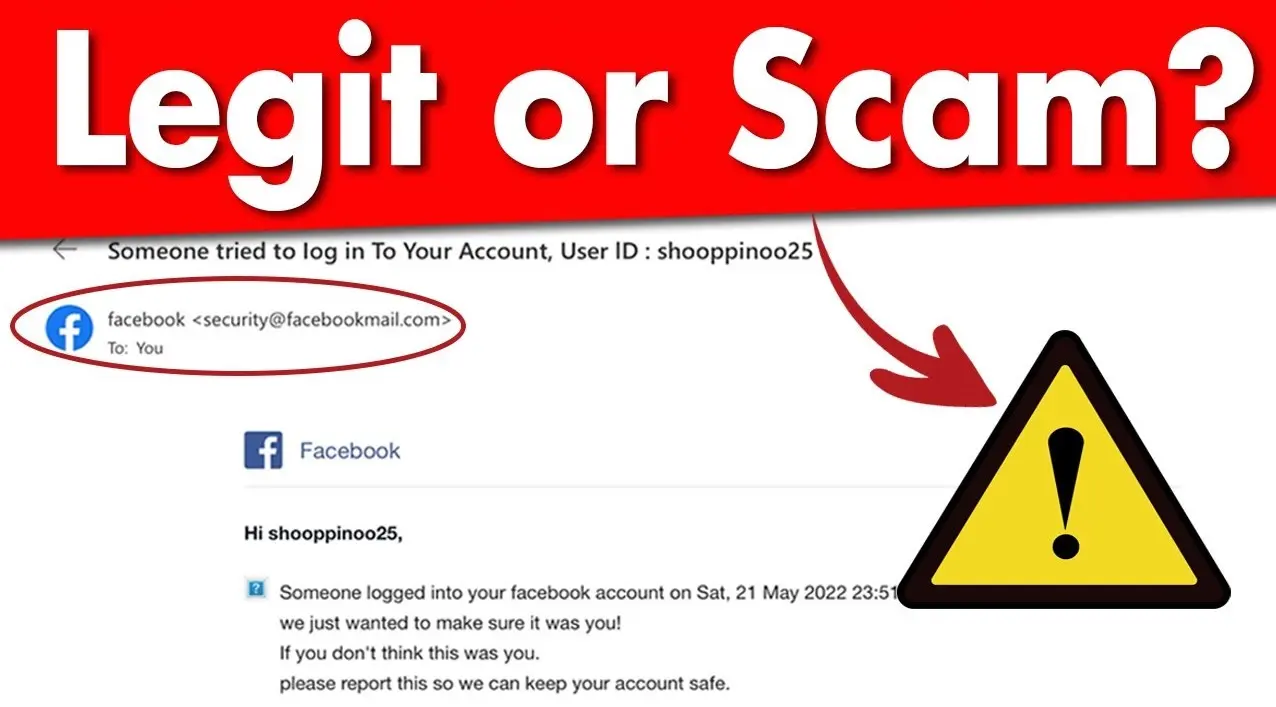Is Facebookmail.com Legit in 2024 ?
You may have seen emails from Facebookmail.com in your inbox. These emails often appear to come from Facebook, notifying you about various updates, like friend requests or security alerts. However, there’s been growing concern about the legitimacy of this domain. Is Facebookmail.com truly safe, or could it be linked to phishing scams?
The reality is that while Facebookmail.com is used by Facebook, the increase in cyber threats and phishing scams means you must stay cautious. Scammers can easily replicate official-looking emails to trick users into sharing personal information or clicking on harmful links. In this article, we will clarify how to identify legitimate emails from Facebookmail.com and what steps to take if you encounter suspicious activity.
What is Facebookmail.com?
Facebookmail.com is an official domain used by Facebook to send notifications and account updates. If you’ve ever received an email from this domain, it was likely related to some action on your Facebook account. For example, you might get a notification about a friend request, a message, or an alert about changes to your account settings. These emails aim to keep you informed about what’s happening on your account.
However, not all emails from Facebookmail.com are always genuine. While the domain itself is legitimate, scammers have figured out ways to mimic it for phishing attacks. They often create fake emails that look very similar to Facebook’s real communications to trick users into giving up personal information. This makes it crucial to verify whether an email from Facebookmail.com is real before interacting with it.
In summary, Facebookmail.com is a domain Facebook uses to communicate with users. But with the rise of phishing scams, it’s important to stay vigilant when receiving emails from this domain. Ensuring its legitimacy is key to protecting your account and personal information.
Is Facebookmail.com Legit?
Yes, Facebookmail.com is a legitimate domain, but caution is essential. It’s used by Facebook to send official notifications, including account updates and security alerts. However, with the increase in phishing attacks, even legitimate domains like Facebookmail.com are sometimes misused by scammers. So, while the domain itself is trustworthy, it doesn’t mean every email from it is safe.
To determine if an email from Facebookmail.com is legitimate, there are key factors you should check. First, look closely at the sender’s email address. Legit emails will come from an address that ends with “@facebookmail.com.” Be careful with emails that may look similar but have slight variations in the spelling of the domain.
Additionally, legitimate emails usually relate to actions you’ve recently taken on Facebook, like updating your password or logging in from a new device. Suspicious emails may ask for personal information, such as passwords or credit card details—something Facebook will never do.
In short, Facebookmail.com is legitimate, but with scammers increasingly mimicking it, you must stay cautious. Always verify any email before clicking on links or sharing sensitive information.
How to Identify a Legitimate Email from Facebookmail.com
Spotting a legitimate email from Facebookmail.com can save you from phishing attacks. There are key factors to consider that will help you identify whether the email is genuine or a scam attempt.
Start by checking the sender’s email address. The email should come from an address ending in “@facebookmail.com.” However, be aware that scammers can create very similar addresses with slight variations, so inspect them closely. If you notice any strange characters or unusual spelling, treat the email as suspicious.
Another telltale sign is personalization. Legitimate emails from Facebook usually include your name or some account-specific details. Emails that begin with generic greetings like “Dear User” instead of using your actual name are often fake. Genuine emails are more likely to reference recent actions on your account, such as a password change or a login attempt from a new device.
Also, look at the content and format. Legitimate Facebook emails follow a consistent, professional structure. They should have minimal to no grammatical errors or awkward phrasing. Scammers often make mistakes in their phishing emails, which can be a clear red flag.
Finally, Facebook will never ask you to provide sensitive information, such as your password or financial details, over email. If the email requests this, it’s almost certainly a scam.
By using these checks, you can better protect yourself from phishing attempts disguised as Facebook emails.
Signs of a Potential Scam from Facebookmail.com
Even though Facebookmail.com is a legitimate domain, scammers frequently misuse it to trick users. Knowing the signs of a scam can prevent you from falling victim to phishing attempts.
One common tactic scammers use is creating urgency or threats in the email. For example, an email might warn you that your account will be suspended unless you act immediately. Facebook does not send emails that pressure you into immediate action. If an email pushes you to click a link or enter information quickly, it’s likely a scam.
Another red flag is poor grammar and spelling. Legitimate Facebook emails are generally well-written and free from errors. If the email has obvious mistakes, awkward phrasing, or looks unprofessional, it’s a sign it might be a phishing attempt.
Be wary of unexpected requests for personal information. Facebook will never ask for your password, credit card details, or any sensitive information through email. If you receive such a request, delete the email and report it.
Finally, avoid clicking on suspicious links and attachments. Scammers often hide malicious links behind legitimate-looking URLs. Before clicking, hover over the link to check if the URL looks suspicious. If it doesn’t lead to Facebook’s official site, it’s best not to engage.
Being alert to these signs can help you avoid falling into phishing traps from scam emails pretending to be from Facebookmail.com.
What to Do If You Receive a Suspicious Email from Facebookmail.com
If you encounter an email from Facebookmail.com that feels off, it’s essential to take the right steps to protect your personal information. Acting quickly and cautiously can help you avoid potential phishing attacks or security breaches.
First, do not click any links or download attachments. Even if the email looks like it’s from Facebook, avoid interacting with it until you’ve verified its legitimacy. Malicious links can lead to fake websites designed to steal your information or download harmful malware onto your device.
Next, verify the email through official Facebook channels. Instead of clicking any links in the email, manually log into your Facebook account by entering the URL into your browser. Once logged in, check for any notifications or alerts on your account. If the email you received was legitimate, you should see corresponding notifications in your Facebook account.
If you suspect the email is a scam, report the phishing attempt to Facebook. You can do this by navigating to Facebook’s Help Center and reporting the email, which helps Facebook take action against fraudulent activity. It’s also a good idea to forward the suspicious email to [email protected] for further investigation.
Finally, after confirming the email is a scam, delete it from your inbox. Keeping it only increases the risk of accidentally interacting with it later.
By following these steps, you can stay safe and ensure that your Facebook account and personal information remain secure.
Frequently Asked Questions (F.A.Q)
Can Facebookmail.com be spoofed?
Yes, it can. Scammers have become skilled at creating fake emails that appear to come from official domains like Facebookmail.com. They use subtle tricks, such as changing a single letter or number in the email address, making it hard to notice. Always double-check the email address and never rely on appearances alone. Verifying directly through your Facebook account is the safest approach.
What should I do if I’ve clicked on a phishing link from Facebookmail.com?
If you’ve clicked on a suspicious link, act fast. Immediately change your Facebook password and enable two-factor authentication if it’s not already activated. It’s also a good idea to scan your device for malware using antivirus software. If you’ve entered personal details, like passwords or payment information, update those accounts and contact your bank or relevant service providers to ensure no unauthorized transactions occur.
Can I block emails from Facebookmail.com?
Yes, you can block emails from Facebookmail.com, but it’s not always advisable. Blocking this domain means you’ll no longer receive important notifications from Facebook, such as security alerts or account updates. Instead of blocking, consider tightening your email filter settings to better detect phishing attempts.
Wrapping Up
Facebookmail.com is a legitimate domain used by Facebook to send official notifications and updates. However, due to the rise of phishing scams, it’s important to remain cautious when receiving emails from this domain. While most of these emails are safe and directly related to your Facebook account activity, scammers can create convincing imitations.
By carefully reviewing the sender’s email address, checking for personalization, and avoiding suspicious links, you can minimize your risk of falling victim to phishing attacks. If you ever feel unsure about an email, verify its legitimacy directly through Facebook’s website and report any suspicious emails immediately. Protecting your account and personal data is essential in today’s digital world.
Read Also:


